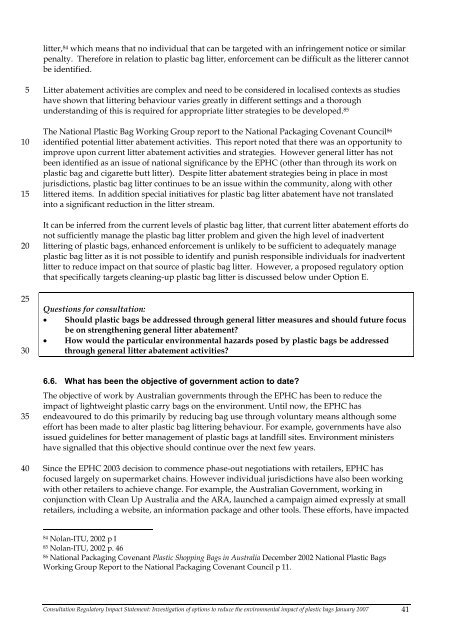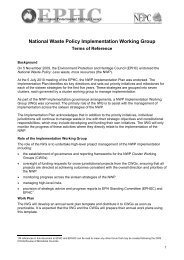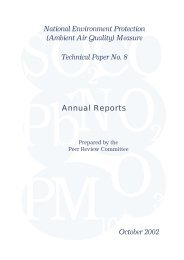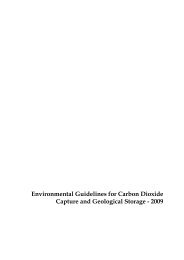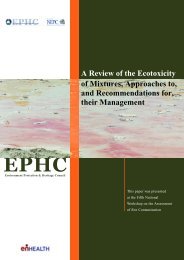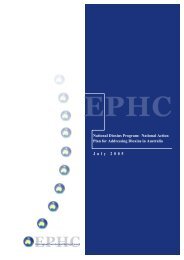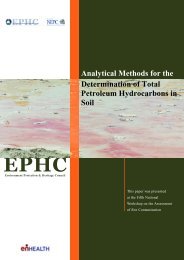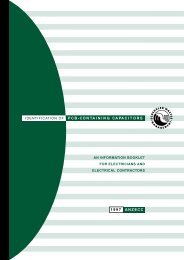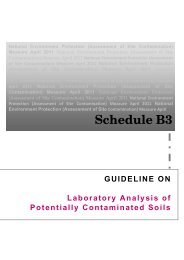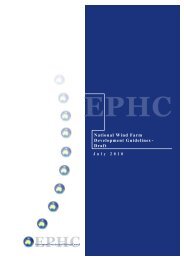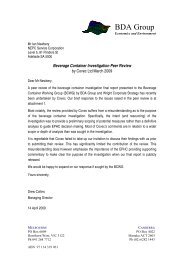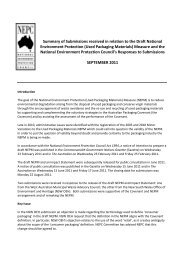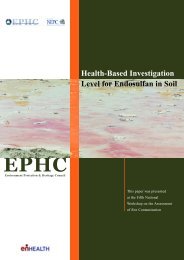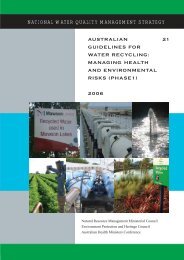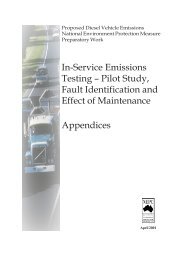Plastic Bags - COAG Standing Council on Environment and Water
Plastic Bags - COAG Standing Council on Environment and Water
Plastic Bags - COAG Standing Council on Environment and Water
Create successful ePaper yourself
Turn your PDF publications into a flip-book with our unique Google optimized e-Paper software.
litter, 84 which means that no individual that can be targeted with an infringement notice or similar<br />
penalty. Therefore in relati<strong>on</strong> to plastic bag litter, enforcement can be difficult as the litterer cannot<br />
be identified.<br />
5<br />
10<br />
15<br />
20<br />
25<br />
30<br />
Litter abatement activities are complex <strong>and</strong> need to be c<strong>on</strong>sidered in localised c<strong>on</strong>texts as studies<br />
have shown that littering behaviour varies greatly in different settings <strong>and</strong> a thorough<br />
underst<strong>and</strong>ing of this is required for appropriate litter strategies to be developed. 85<br />
The Nati<strong>on</strong>al <str<strong>on</strong>g>Plastic</str<strong>on</strong>g> Bag Working Group report to the Nati<strong>on</strong>al Packaging Covenant <str<strong>on</strong>g>Council</str<strong>on</strong>g> 86<br />
identified potential litter abatement activities. This report noted that there was an opportunity to<br />
improve up<strong>on</strong> current litter abatement activities <strong>and</strong> strategies. However general litter has not<br />
been identified as an issue of nati<strong>on</strong>al significance by the EPHC (other than through its work <strong>on</strong><br />
plastic bag <strong>and</strong> cigarette butt litter). Despite litter abatement strategies being in place in most<br />
jurisdicti<strong>on</strong>s, plastic bag litter c<strong>on</strong>tinues to be an issue within the community, al<strong>on</strong>g with other<br />
littered items. In additi<strong>on</strong> special initiatives for plastic bag litter abatement have not translated<br />
into a significant reducti<strong>on</strong> in the litter stream.<br />
It can be inferred from the current levels of plastic bag litter, that current litter abatement efforts do<br />
not sufficiently manage the plastic bag litter problem <strong>and</strong> given the high level of inadvertent<br />
littering of plastic bags, enhanced enforcement is unlikely to be sufficient to adequately manage<br />
plastic bag litter as it is not possible to identify <strong>and</strong> punish resp<strong>on</strong>sible individuals for inadvertent<br />
litter to reduce impact <strong>on</strong> that source of plastic bag litter. However, a proposed regulatory opti<strong>on</strong><br />
that specifically targets cleaning-up plastic bag litter is discussed below under Opti<strong>on</strong> E.<br />
Questi<strong>on</strong>s for c<strong>on</strong>sultati<strong>on</strong>:<br />
• Should plastic bags be addressed through general litter measures <strong>and</strong> should future focus<br />
be <strong>on</strong> strengthening general litter abatement?<br />
• How would the particular envir<strong>on</strong>mental hazards posed by plastic bags be addressed<br />
through general litter abatement activities?<br />
35<br />
40<br />
6.6. What has been the objective of government acti<strong>on</strong> to date?<br />
The objective of work by Australian governments through the EPHC has been to reduce the<br />
impact of lightweight plastic carry bags <strong>on</strong> the envir<strong>on</strong>ment. Until now, the EPHC has<br />
endeavoured to do this primarily by reducing bag use through voluntary means although some<br />
effort has been made to alter plastic bag littering behaviour. For example, governments have also<br />
issued guidelines for better management of plastic bags at l<strong>and</strong>fill sites. Envir<strong>on</strong>ment ministers<br />
have signalled that this objective should c<strong>on</strong>tinue over the next few years.<br />
Since the EPHC 2003 decisi<strong>on</strong> to commence phase-out negotiati<strong>on</strong>s with retailers, EPHC has<br />
focused largely <strong>on</strong> supermarket chains. However individual jurisdicti<strong>on</strong>s have also been working<br />
with other retailers to achieve change. For example, the Australian Government, working in<br />
c<strong>on</strong>juncti<strong>on</strong> with Clean Up Australia <strong>and</strong> the ARA, launched a campaign aimed expressly at small<br />
retailers, including a website, an informati<strong>on</strong> package <strong>and</strong> other tools. These efforts, have impacted<br />
84 Nolan-ITU, 2002 p I<br />
85 Nolan-ITU, 2002 p. 46<br />
86 Nati<strong>on</strong>al Packaging Covenant <str<strong>on</strong>g>Plastic</str<strong>on</strong>g> Shopping <str<strong>on</strong>g>Bags</str<strong>on</strong>g> in Australia December 2002 Nati<strong>on</strong>al <str<strong>on</strong>g>Plastic</str<strong>on</strong>g> <str<strong>on</strong>g>Bags</str<strong>on</strong>g><br />
Working Group Report to the Nati<strong>on</strong>al Packaging Covenant <str<strong>on</strong>g>Council</str<strong>on</strong>g> p 11.<br />
C<strong>on</strong>sultati<strong>on</strong> Regulatory Impact Statement: Investigati<strong>on</strong> of opti<strong>on</strong>s to reduce the envir<strong>on</strong>mental impact of plastic bags January 2007 41


